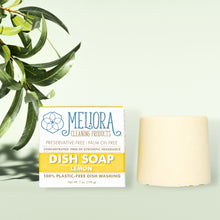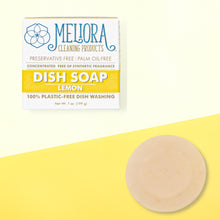Replaces roughly 3-6 bottles of traditional liquid soap!
100% Plastic-Free
✓ Dye-Free
✓ Preservative-Free
✓ Palm-Oil Free
✓ Cruelty-Free
✓ Synthetic Fragrance-Free
We've taken our approach to simple, effective, people- and planet-friendly cleaning and brought it to your sink. Our Dish Soap is an awesome plastic-free, zero-waste option to wash your dirty dishes, pots, and pans.
Ditch the bulky, slippery plastic bottle with these simple steps:
- Place our Dish Soap puck on a soap dish, coaster, or right on the edge of your sink.
- Wet your sponge/brush, rub it over your Dish Soap, and wash away.
- For those extra dirty items that need a soak - or to fill the entire sink - simply hold the Dish Soap under the faucet while the water is running.
Full Ingredient List [LEMON]: Vegetable Soap [Sodium Cocoate, Sodium Sunflowerate, Glycerin, Water, Organic Cocos Nucifera (Coconut) Oil, Organic Helianthus Annuus (Sunflower) Seed Oil], Organic Citrus Medica Limonum (Lemon) Peel Oil
*lemon essential oil naturally contains the potential allergen limonene.
Each plastic-free Dish Soap puck is 7 oz. [199 g]
Each item is Vegan, Cruelty-Free, and MADE SAFE Certified. 1% of every sale goes towards environmental causes.
Nerd Alert: More Detailed Information On Ingredients:
Our Dish Soap for Handwashing uses Coconut and Sunflower Seed Oils as the base vegetable oils for the soap. This combination gives us a firm bar that lathers and cleans while easily rinsing away.
Sourced from Century Sun Oil out of Pulaski, WI, sunflower oil is a local alternative to the olive oil. We've used sunflower oil in our Bath and Body Soap Bars for a while, as we're excited to bring it to our cleaning products collection.
Sodium Cocoate: This is the chemical name of saponified (that is, 'made into soap') coconut oil. It's the chemical that grabs onto both dirt and water to do the cleaning.
Sodium Sunflowerate: This is the chemical name of the saponified sunflower seed oil.
Glycerin: This substance is chemically a type of alcohol and is naturally created when the oil is converted into soap. Glycerin is known for skin-softening abilities and is an effective solvent, meaning it can dissolve substances such as stains and dirts.
Organic Cocos Nucifera (Coconut) Oil and Organic Helianthus Annuus (Sunflower) Seed Oil : There is always some coconut and sunflower seed oils left in the soap after conversion to sodium cocoate and sodium sunflowerate. This is because we use sodium hydroxide, or lye, in the conversion process. Leaving these excess oil in the soap not only ensures there is no remaining lye in the finished product, it also gives the soap its lather and moisturizing feel. Some soapmakers refer to this as 'superfatting' and more oil remaining results in a softer, more moisturizing bar.
Water: Water is used in the soapmaking process as a substance that dissolves lye and then is a medium so the lye can reach all of the oil to react. After being useful in this process, the water is allowed to evaporate from the soap over a period of several weeks, and the resulting dried bar has very little water. There is only about 5% water remaining in the finished bars, thus making them more shelf stable than a liquid soap that would require a preservative due to the high (about 60%) water.





